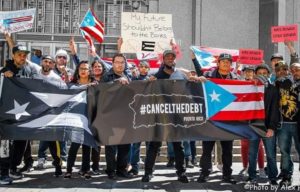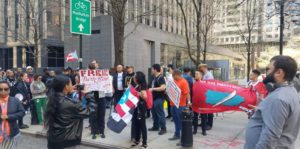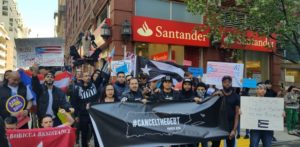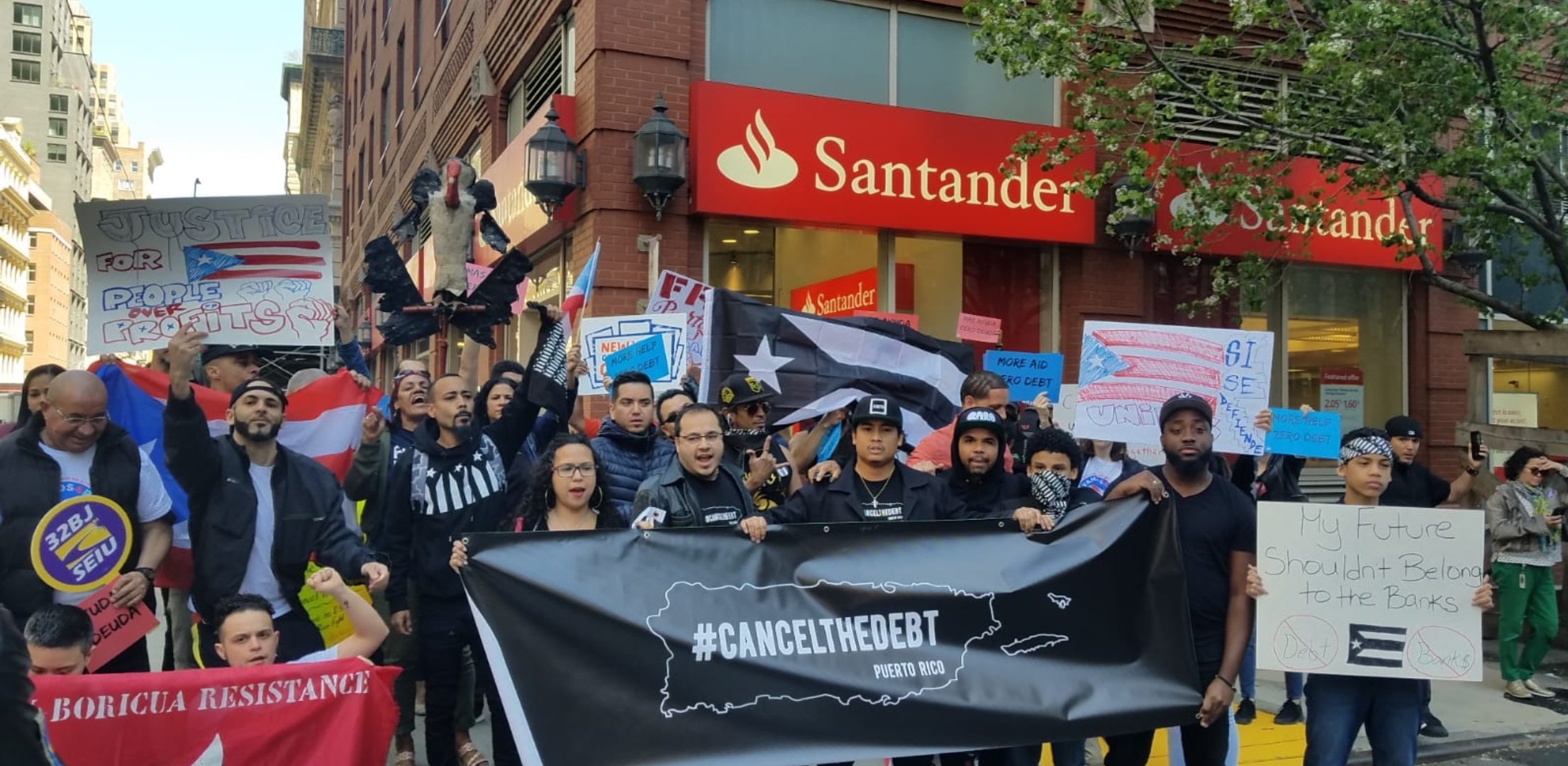On Wednesday April 24th, in Federal court located in San Juan and streamed live via close circuit to a Federal court in New York City, Judge Taylor Swain proceeded over one of Puerto Rico’s most critical hearings in the debt restructuring of the Commonwealth of Puerto Rico. Not only was the legality of $6 billions of the debt in debate, but the statue of limitation to sue individuals and entities responsible for Puerto Rico’s economic collapse is May 2nd, making nearly impossible to avoid the topic. The difficulty of this topic stems mostly to public knowledge of at least two members of the Financial Oversight and Management Board having direct involvement to the island’s bond issuance during times that the island’s solvency was highly questionable. The names of the “bad actors” as referred to during the hearing are been kepted a secret from the public under the request of the Board and approval of Judge Swain.

#CANCELTHEDEBT Rally – Photo by Alex Ruiz
It was evident that the tension of the Board’s potential conflicts of interest that has been stacking up since their original naming around two years ago is hitting an all time high both in the court and within the public community. The counsel for the Special Claims Committee had to pause multiple times attempting to make his arguments while complying with Judge Swain’s acceptance to keep anonymous the names of so called “bad actors” as referrence to various times.

“The Board is the only entity that can sue on behalf of the Government of Puerto Rico…”, Judge Swain explained, “they are responsible for ensuring the citizens of Puerto Rico can meet their needs and the Commonwealth can return to the financial markets “. She continued with saying that the Board will have to earn the trust of all involved and of the public, and that they will have to live with the consequences of their actions. This was while denying the ability for the counsel acting under Unsecured Creditors Committee (UCC) for seeking additional claims not sympathized by the PROMESA Board. Judge Swain’s statement iterated the Board’s unique jurisdiction, autonomy and power as it was deemed by Congress under the PROMESA law.
Meanwhile, both inside the court room and out, public activists demonstrate their distrust to the Board, the court proceedings and the federal government in San Juan and various other cities in the Mainland. In San Juan a citizen was requested to remove a t-shirt that read “#CANCELTHEDEBT” and another was removed from the court room for holding a sign for the cancellation of the debt.
“Washington is responsible for the appointment of individuals that were accomplice to Puerto Rico’s economic collapse which shows corruption runs deep, and the fact that the COFINA negotiation was approved only demonstrates that these hearings are no more than a scripted show despite the public outcry and the professional opinion of economists…”, was the sentiment of an activist outside the New York Federal Court building while a manifestation requesting to cancel the debt was taking place. Many rallied in front of the court house and then made their way to a nearby Santander bank shouting “cancel the debt, cancel the debt” and in another instance “Judge Taylor Swain, put people over profits”.

#CANCELTHEDEBT Rally front of Santander – Photo by Alex Ruiz
Santander bank was symbolic for the protestors, because Carlos M. García and José R. González who are currently members of the PROMESA Board and who are responsible for the fate of Puerto Rico were also executives of Santander bank and the island’s Governmental Bank where decisions to continue increasing Puerto Rico’s debt where made. In a statement during the trial there are 27 banks, 7 lawyers and 5 accounting firms that can faces charges ranging from fraudulent underwriting to the intention to defraud investors.
One of the counsels attempted to remind the court that going after individual “bad actors” was going to be difficult especially since the local island’s legislators passed a law to protect individuals involved in the bond market from personal liability. But the counsel for the Special Claims Committee later countered all the arguments and clarified that in fact individuals were liable for their actions. The counsel also reminded the court that the individuals committed their acts prior to the approval of the Puerto Rico law that protects “bad actors” at a personal basis. Public sentiment is that individuals will most likely go unrecognized and without consequences since the Board is comprised of individuals that would otherwise be held accountable.
In a separate instance, while debating the legality of $6 billion that were issued in 2012 and 2014, the counsel for the bondholders, also referred to as the PBA lawyer, highlighted the Board’s selective process in determining as he stated “fraud bonds” and argued that the Board intends to harm some investors while benefiting others. The counsel argued that he didn’t believe any of the bonds were a fraud, but if these specific bonds were a fraud under the premise used by the Board, then all the bonds between these dates should also be a fraud and eliminated, and stated, “base on the Board’s argument rather than pursuing $6 billion it would be more like $12 billion that would be considered as fraud debt”. The counsel also eluded to bonds issued prior to 2012 as also exceeding the island’s constitutional debt limit as part of his arguments.
The Board’s main basis to invalid certain bonds is based on the issuance of bonds that were above the Commonwealth’s constitutional debt limit. The counsel for the Board remarked that although at the moment these specific bonds are being pursued for cancellation, it doesn’t eliminate the possibility of other bonds from been considered for cancellation due to the same premise further down the line.
The PROMESA Board has been facing public scrutiny since they were originally named two years ago. Not only was the PROMESA legislation very unpopular among citizens due to what many say is an imposed federal authority that is un-democratic, having responsibility over citizens without having to respond to no one but the President of the United States. The Board names included three individuals that are well known by locals as having ties to the banking industry in the island that raised suspicion and lack of confidence before they could even begin with their work. Public confidence was further shattered after Judge Swain approved the COFINA negotiations back in February eliminate what little hope many had in the justice system as serving as an impartial agent to ensure that the PROMESA Board comply with its mandate to act in the best interests of the citizens of Puert Rico. Many believe that the Board will meet their objective to return the Commonwealth to the financial markets, but only on the backs of the working class and retirees that have already seen more than a dedeca austerity and economic depression.
The next hearing was set for May 1 in Boston and to be streamed closed circuit to San Juan. The 1st Circuit Court in Boston found the appointment of the Board to have been done illegally, using the wrong mechanism, and gave them a 90 day term which expires May 16th to wrap up any dealings and/or go through the appropriate appointment process.

COMMENTS